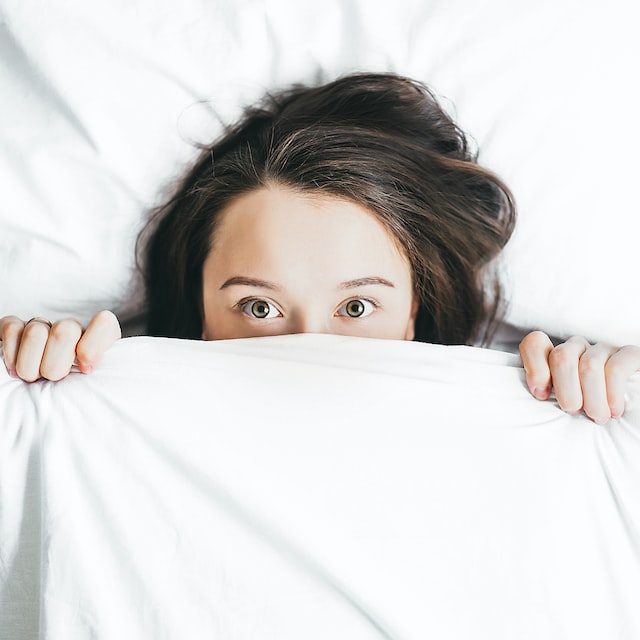
Body + Mind is reader-supported. We may earn an affiliate commission when you buy through some of the links on our site.
We all get anxious sometimes, but those with anxiety disorders often struggle to keep negative thoughts at bay. These symptoms make it difficult to do many activities, including sleep.
Insomnia and anxiety are linked. Anxiety can cause you to not fall asleep at night and getting little sleep can lead to more anxiety.
If you find your anxiety symptoms cause insomnia, there are things you can do to get the rest you need. Here are five tips to curb insomnia and anxiety.
Mindful meditation is an excellent way to center your mind and prepare you for quality sleep. Mindfulness helps many people deal with anxiety because it focuses on the present, not the past or future.
Learning to meditate can help you relieve those late-night jitters and feel at peace as you drift off.
You don’t have to be an expert to begin meditating. Many free or low-cost guided meditations online gently instruct you on what to do and when.
Meditation is a skill, and the more you practice it, the better you’ll become at it. Research shows that just 10 minutes of mindful meditation can reduce the intrusive thoughts that can come with anxiety.
When you are able to relax your mind, you can fall asleep faster and sleep better throughout the night.
Journaling is a great way to get anxious thoughts out of your mind before bed.
Writing is an excellent way to get your thoughts and frustrations out that you struggle to say. By seeing them written down, you may also identify new patterns in your anxious thoughts, helping you identify and avoid triggers and come to new realizations.
You can choose to write your stream of consciousness to relieve yourself from negative thoughts, or you might choose a journal with prompts that guide you to get feelings out or explore new thought processes. A 2018 study found that one month of emotion-based journaling can help improve your mental health.
These can be especially helpful if you use cognitive behavioral therapy (CBT) – you’ll receive guidance as you work through each anxious thought.
Another journaling method that can help with anxiety before bed is the gratitude journal. There are different versions out there, but all involve focusing on the positive things in life. Anxiety can easily cause you to focus on the negative, but these journals can help you rediscover the positive before you drift off to sleep.
Creating and sticking to a nighttime routine can help relieve stress and anxiety by training your body to get into a state of relaxation before bed.
Taking a warm bath or shower, reading a light-hearted book, indulging in some decaffeinated tea or warm milk, using scented lotions, or listening to a favorite podcast or meditation track can get your mind into a state with less anxiety and calmer.
Research has found that repetitive routines can help relieve anxiety. This applies to many different areas of life, including as you settle in for the night.
By finding the things that help you relax and doing them every night before bed, you improve your mental well-being and get a relaxing night’s sleep.
Aromatherapy is another way to relieve anxiety at night and help you sleep. Certain scents and essential oils can relax the mind and body so you can drift off with ease.
You want to be careful to try out the right scents. Certain oils, like citrus and peppermint, smell good but can make you more alert than you should be before bed. Relaxing oils – like lavender, sage, rose, and eucalyptus – all work well to help your mind and body unwind.
There are several ways you can incorporate these scents into your nighttime routine, including candles, diffusers, pillow sprays, and skin care. You can also incorporate their use into deep breathing or meditation exercises.
Adding these oils to your routine can make you clear your mind and curb anxiety and insomnia. Different oils such as frankincense and sandalwood can also help you feel focused and relaxed in the morning.
Exercise works in several ways to relieve anxiety and help you sleep. It releases mood-boosting hormones like serotonin that can help you feel better and focus less on any anxious or negative thoughts. Research shows that incorporating exercise into your daily activities can significantly reduce the symptoms of depression and anxiety.
Just a few minutes of walking, running, biking, or swimming can benefit you, and doing so before bed can help you get into the right headspace to sleep.
Exercise also relieves anxiety symptoms by improving your overall health. Your physical and mental health are connected, and when you keep your body healthy, it’s easier to keep your mind healthy. Exercise is a key part of keeping your health.
When you struggle with anxiety, it can be hard to sleep at night. Thankfully, there are proven things you can try to cope better with your anxious thoughts, allowing you to get a good night’s rest finally.
Your email address will only be used to send you our newsletter, and at any time you may unsubscribe. For more information, see our Privacy Policy.